
Click on the pictures to get a better view! :D
 Boon Chan (2009, Feb 8). New Surgery to Harvest Kidneys. The Straits Times, p. 8.
Boon Chan (2009, Feb 8). New Surgery to Harvest Kidneys. The Straits Times, p. 8.After being MIA from this blog for 1 year, I found this on today's Straits Times Paper 8th of Feb and I''m amazed at how medical science has advanced in just one year!!!
I went off @
2:22 AM
I recalled 2 months back, Broney had an artificial bone implant. She did not face much difficulty during her road to recovery. Her healing process took a few months and very soon she was up and hopping!
Dr Leevur gave me a brochure regarding bone artificial implants. It was very interesting, so I thought I could share it with my loyal readers.
Enjoy =D
Fast Facts about
Bone Artificial Implants:
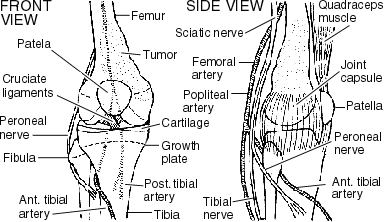
When need to use artificial implants?- A tumor of the distal femur would destroy the adjacent bone near to the knee, this would results in the tumor spreading to the muscles, blood vessels and nerve.
- Amputation is necessary so as to minimize the chances of surgical complications. It also ensure that the local tumor is removed.
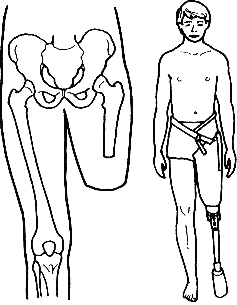
Why need to use artificial implants??
- Patients may be difficult to adapt to the sudden lost in limbs.
- They also can’t accept the change in appearance.
Different types of artificial implants available
- Bone and Joint Transplant (Osteoarticular Allograft.
- Lower end of the femur can be replaced with a bone implants with a joint surface (osteoarticular allograft).
- Bones are joined by metal plates and screws, the muscles and joint ligaments are reattached to the transplant to form a working joint.
- Advantages: normal movement is restored.
- Disadvantages: complexity of the surgical procedure ( possible injry to major blood vessel or nerve)
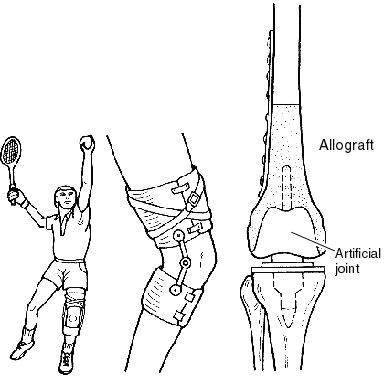
Metallic Prosthesis- An artificial metallic implant that can be used to replace the entire end of femur and knee joints.
- Rod portion of the implant fits into the hollow marrow cavity in the femur, and secured with bone cement.
- Advantages: faster recovery than allograft.
- Disadvantages: possible cases of loosening, breakage and erosion.
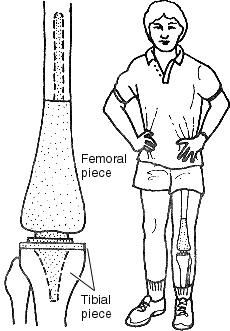
Arthrodesis- It is a permanent joint fusion.
- A section of bone graft (obtained from another site in the body or from a bone bank) is used to bridge the gap between the femur and tibia (knitting the bones at both ends) and is held in place by metal plates, screws or rods.
- Advantages: walking and running and non-contacts sports are possible after healing.
- Disadvantages: stiff knee
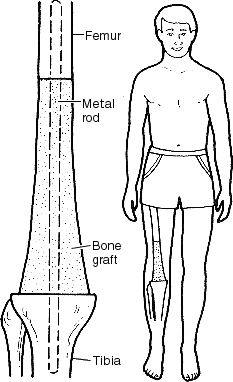
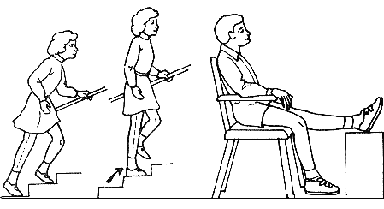
Then I asked Dr Leevur about corneal transplant, since it's very popular these days. I think he is too tired to explain to be any further, he gave me a brochure.
Good thing this way, I have hard copy of the information! yayyy!
CORNEAL TRANSPLANTATION - It is also known as keratoplasty.
- The cornea come from a dead person.
- Cornea is composed entirely of a special type of collagen.
- Cornea normally contain no blood vessel.
Purpose??
- Use when vision is lost in an eye due to damage of cornea.
- Surgery would only be carried out if only corrective lenses are useless with the case.
Process
- A disc of tissue is removed from the centre of the eye.
- It is then substituted by a corresponding tissue from the donor’s eye.
- The incision is made by a instrument called a trephine.
- The disc removed and replaced is the entire thickness of the cornea.
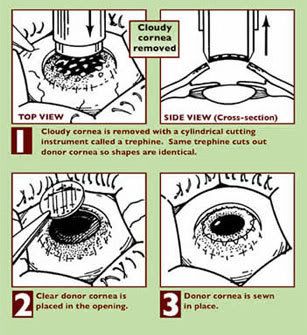 http://www.coleb.org/images/corneal_transplants2.jpg
http://www.coleb.org/images/corneal_transplants2.jpg
- Very low risks of rejections.
- This is because cornea contains no blood vessels, thus it would have low rate of rejections.
- This is because allograft rejection occurs due to reaction between the patient’s immune system and the donor tissue, which is triggered by histocompatibility antigens.
- Histocompatibility antigens is often associated with vascular tissue ( blood tissue) within the graft tissue.
Health A to Z (2004). Corneal Transplantation. Singapore. Retrieved 8 Feb, 2009 from the World Wide Web: http://www.healthatoz.com/healthatoz/Atoz/common/standard/transform.jsp?requestURI=/healthatoz/Atoz/ency/corneal_transplantation.jsp
(:
XOXO
I went off @
3:28 PM
I found some information about artificial transplant at http://www.kidney.bc.ca/kidneys/transplants/index.html and brought it over to Mt. Temasek Specialist Centre. Dr Leevur confirmed with me that the information I found was correct.
Pros:
1. Reduced risk of rejection due to the absence of antigens production in artificial organs
2. No need for donor, reduced time for waiting
3. Patient’s pain eased
4. No need for dialysis
5. Diet and fluid restriction gone
6. Normal lifestyle returned
Cons:
1. Finite life span of implants due to wear and tear
2. Need to be replaced after a certain time
3. Costly
4. Hip or knee replacement surgery must undergo surgical revision within three years
5. Constant revision
6. Unnatural
7. Emotionally unease for some people
8. Medication might be necessary
Grandma is currently relying on dialysis, we need to make a decision soon. Weighing the pros and cons, there seems to be more cons than pros, but this is our only hope!

Its really troublesome to go for dialysis 3 times a week all the way to MTSC, and given grandma's fragile state it's really worrying for us and dialysis is really not a long-term solution. Anyhow, heres a picture of how dialysis works from
http://www.ivy-rose.co.uk/Topics/Urinary/Kidney_Dialysis_cIvyRose.jpg for all you people out there who are not sure how it works!
I went off @
2:00 AM
Dad was very very against Grandma going for artificial transplant. He felt that it was too dangerous given its slim success rate.
Dad: Why can’t you get her some drug treatment, and let her forgo the pain?
Dr Leevur: Drugs will not work for hyperacute rejection. It will be only effective on the other rejections.
Grandma please stay strong!
I went off @
12:21 PM
It’s been 2 weeks after the transplantation. On my side, the pain from the operation is subsiding. However Grandma didn’t have such a smooth sailing process. She faced hyper acute renal transplantation rejection straight after the transplantation.
 Kuby, Janis (1992). Immunology. Transplantation Immunology (pp. 492). USA: Freeman
Kuby, Janis (1992). Immunology. Transplantation Immunology (pp. 492). USA: Freeman Kuby, Janis (1992). Immunology. Transplantation Immunology (pp. 494). USA: Freeman
Kuby, Janis (1992). Immunology. Transplantation Immunology (pp. 494). USA: FreemanDr Leevur explained that it is due to activation of T cells (white blood cells), which, in turn, stimulate specific antibodies against the graft. Various clinical syndromes of rejection can be correlated with the length of time after transplantation. He said that the transplant needed to remove immediately so as to prevent a severe systemic inflammatory response.
His words left us feeling as we were back to square one. ):
My interest on the rejection grew as I really wanted to know what’s going on in Grandma’s body. He went on to show me diagrams summarising the four different types of rejections:
1) Hyperacute rejection – occurs immediately in the operation room
2) Acute rejection- occurs both 10days after transplantation
3) Late acute rejection- occurs approximately 6 months after transplantation
4) Chronic rejection- occurs more than 1 year after transplantation
Dr Leevur said that Grandma was suffering from
Hyperacute rejection. It could be avoided if tissue typing and ABO blood group typing are performed prior to transplantation. These pre-existing antibodies can be detected and graft that will result in hyperacute rejection can be avoided. He added that due to time constraint, he did not perform this typing for us. Thus, the transplant must be immediately removed. The doctor recommended Grandma undergoes a artificial kidney transplant.
To make things worse, Dr Leevur said that artificial kidney transplant is not a very established treatment. He warned us of the many complications and hopes we will consider over the weekends.
This is totally a snowball effect; problem is just getting bigger and bigger.
Sigh

Kuby, Janis (1992). Immunology. Transplantation Immunology (pp. 489). USA: Freeman
I found this diagram to help better understand about what happens to the blood vessel on acceptance and rejection. Click on the picture to get a clearer picture!
I went off @
2:25 AM
I can't sleep! I keep thinking about the worst case scenario. I have to admit, I am really really scared. I have never went under the knife before, and I am not sure what will happen.
Ahhhh!!! Someone please stop me from imagining all these crazy ideas!
I need to pull myself together and be strong for grandma!
Goodnight!
Hope I will see you all when I get back from my operation in around 2weeks time! *slaps myself*
I WILL SEE YOU ALL AGAIN!
I went off @
6:25 PM
Dr. Leevur called us again with good news, he told us that we better go down to the Mount Temasek Specialist Center (MTSC) later.
True enough, I can donate my kidney to grandma. He advised that we do the transplant asap, and it would be best to do it tomorrow. I was not really mentally prepared for it to come so quick, but my grandma's life was at stake! I agreed to do the transplant and was given endless papers to sign!
I went off @
6:00 AM
On a lighter note, while doing some research on my kidney transplant operation I discovered a lake named:
Kidney Lake! Apparently it is in a shape of a kidney and located in Killarney Provincial Park, Ontario. Maybe after Grandma and I have
fully recovered in about 6-12 months we can visit this beautiful place :)
 http://bighugelabs.com/flickr/onblack.php?id=2933478314&size=large
http://bighugelabs.com/flickr/onblack.php?id=2933478314&size=large
I went off @
11:40 PM
Dr Leevur called us, telling us he had important news to tell us and we need to go down to the hospital later. He especially mentioned that I should be there. I was puzzled at first, and then I remembered signing up as a kidney donor.
Once we reached his office, he told us he had found us a suitable donor. We were all elated and thankful. He went on to mention that
the donor is ME! At first, Dad and Mom were a little hesitant to let me donate my organ but Dr Leevur assured that there is an
80% of success rate and he is an extremely experienced doctor with over 30 kidney tranplant operations under his belt.
I didn’t have anything in mind except saving Grandma. It really hurts to see her lying on the bed, feeling so weak and frail.
What hurt the most was I couldn’t bear to see so many tubes poking into her skin and watching her weaken day by day.
Dr Leevur briefed me of the procedures I have to undertake. I have to go for a screening for transmissible infectious agents like
HIV, Hepatitis viruses A, B, C, D and E and human T-cell Lymphotropic virus type 1, herpesvirus (cytomegalovirus [CMV], herpes simplex virus [HSV] and Epstein-Barr virus [EBV]).
Oh my God, SO MANY!!? But for grandma, I wíll do it.Wish me luck!
I went off @
11:18 PM
We received a call from Uncle, and rushed down immediately to Mount Temasek Specialist Center. Upon arrival, we found out some terrifying news! Grandma, who was admitted in the hospital for 3 weeks, has kidney failure and she needs a kidney transplant urgently.
We were lost for word and all we could do is cry );
Dad arranged an appointment with Dr Leevur, he told us to find a kidney donor asap.
Dr Leevur told us given her severe condition, we need to find her a donor as soon as possible.
Dr Leevur: The donor’s blood type must match Mdn Pencrest aka our grandma.
Anyone of blood type AB-? Go for a blood test now!

http://www.flickr.com/photos/morgspace/423622783/
We hope God will send angels to help us.
Xoxo
I went off @
11:13 PM
HI WORLD!I just created a new blog, took like f.o.r.e.v.e.r. to find the perfect blog! Really like the relaxing picture of the beach and the crystal clear blue waters.
Ahh...
What a dream place to be :D
I went off @
12:36 PM
 Click on the pictures to get a better view! :D
Click on the pictures to get a better view! :D














 ming fang
ming fang
 de yuan
de yuan
 ferlicia
ferlicia
 melissa
melissa
 pamela
pamela
 hui teng
hui teng
 DR. Hawt Leevur
DR. Hawt Leevur